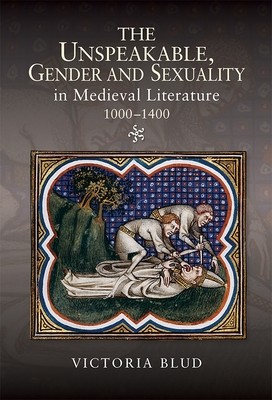
- We will send in 10–14 business days.
- Author: Victoria Blud
- Publisher: Boydell & Brewer
- ISBN-10: 1843844680
- ISBN-13: 9781843844686
- Format: 15.6 x 23.4 x 1.4 cm, hardcover
- Language: English
- SAVE -10% with code: EXTRA
The Unspeakable, Gender and Sexuality in Medieval Literature, 1000-1400 (e-book) (used book) | bookbook.eu
Reviews
Description
An investigation of the motif of the unspeakable as manifested in a wide range of medieval texts, from the Exeter Book to Chaucer.
Amid saints and sinners, open secrets and queer codes, the mechanisms of confession and the infliction of torture, what is unspeakable in the Middle Ages - and who decides? Aspiring to the ineffable glories of heaven or plunging down to the murky depths of "unmentionable sin", this very functional concept becomes attached to the very good and the very bad in medieval literature and culture.This book investigates the concept and use of the trope of unspeakability from pre-Conquest to late medieval literature in England, and the relationship between that which cannot be said and cultural and social understandings of gender and sexuality. The question of how the unspeakable returns to the realm of discourse drives the exploration of texts, including the Exeter Book, Old English hagiography, Ancrene Wisse, Old French romance, Gower's Confessio Amantis and Chaucer's Canterbury Tales and Legend of Good Women. Theorising the work this concept performs, asking who the unspeakable works for and who it works on, this study takes in the compulsive confessions of penitent whores and anchorites, the tales of could-be sodomites and crypto-lesbians, the howls of wolf-men (and wolf-women), and the rebellion and rhetoric of the tongueless. These texts show how in representations of gender and sexuality in medieval literature, the unspeakablechallenges the voiceless to overcome silence, showing the limits of language, the workings of power and the desire to be heard. Victoria Blud gained her PhD from King's College London and is currently a Research Associate at the Centre for Medieval Studies, University of York.
EXTRA 10 % discount with code: EXTRA
The promotion ends in 20d.22:06:30
The discount code is valid when purchasing from 10 €. Discounts do not stack.
- Author: Victoria Blud
- Publisher: Boydell & Brewer
- ISBN-10: 1843844680
- ISBN-13: 9781843844686
- Format: 15.6 x 23.4 x 1.4 cm, hardcover
- Language: English English
An investigation of the motif of the unspeakable as manifested in a wide range of medieval texts, from the Exeter Book to Chaucer.
Amid saints and sinners, open secrets and queer codes, the mechanisms of confession and the infliction of torture, what is unspeakable in the Middle Ages - and who decides? Aspiring to the ineffable glories of heaven or plunging down to the murky depths of "unmentionable sin", this very functional concept becomes attached to the very good and the very bad in medieval literature and culture.This book investigates the concept and use of the trope of unspeakability from pre-Conquest to late medieval literature in England, and the relationship between that which cannot be said and cultural and social understandings of gender and sexuality. The question of how the unspeakable returns to the realm of discourse drives the exploration of texts, including the Exeter Book, Old English hagiography, Ancrene Wisse, Old French romance, Gower's Confessio Amantis and Chaucer's Canterbury Tales and Legend of Good Women. Theorising the work this concept performs, asking who the unspeakable works for and who it works on, this study takes in the compulsive confessions of penitent whores and anchorites, the tales of could-be sodomites and crypto-lesbians, the howls of wolf-men (and wolf-women), and the rebellion and rhetoric of the tongueless. These texts show how in representations of gender and sexuality in medieval literature, the unspeakablechallenges the voiceless to overcome silence, showing the limits of language, the workings of power and the desire to be heard. Victoria Blud gained her PhD from King's College London and is currently a Research Associate at the Centre for Medieval Studies, University of York.


Reviews